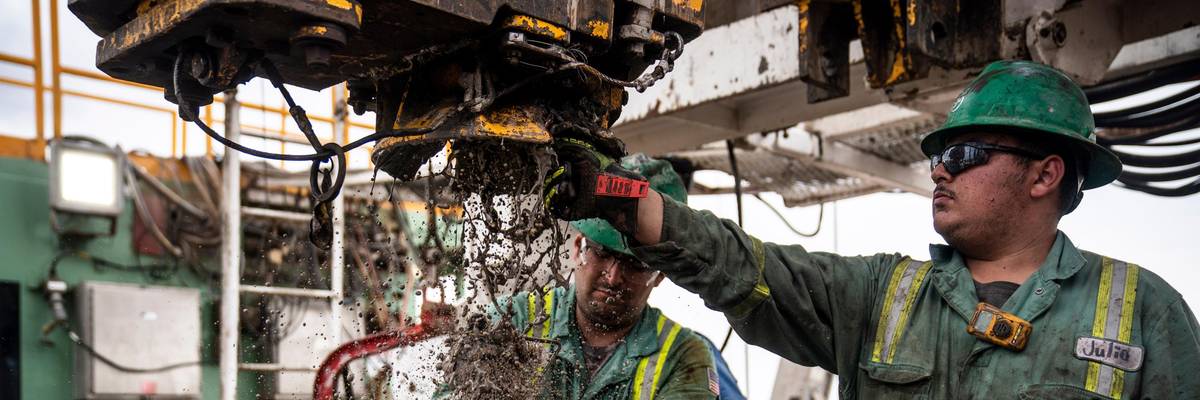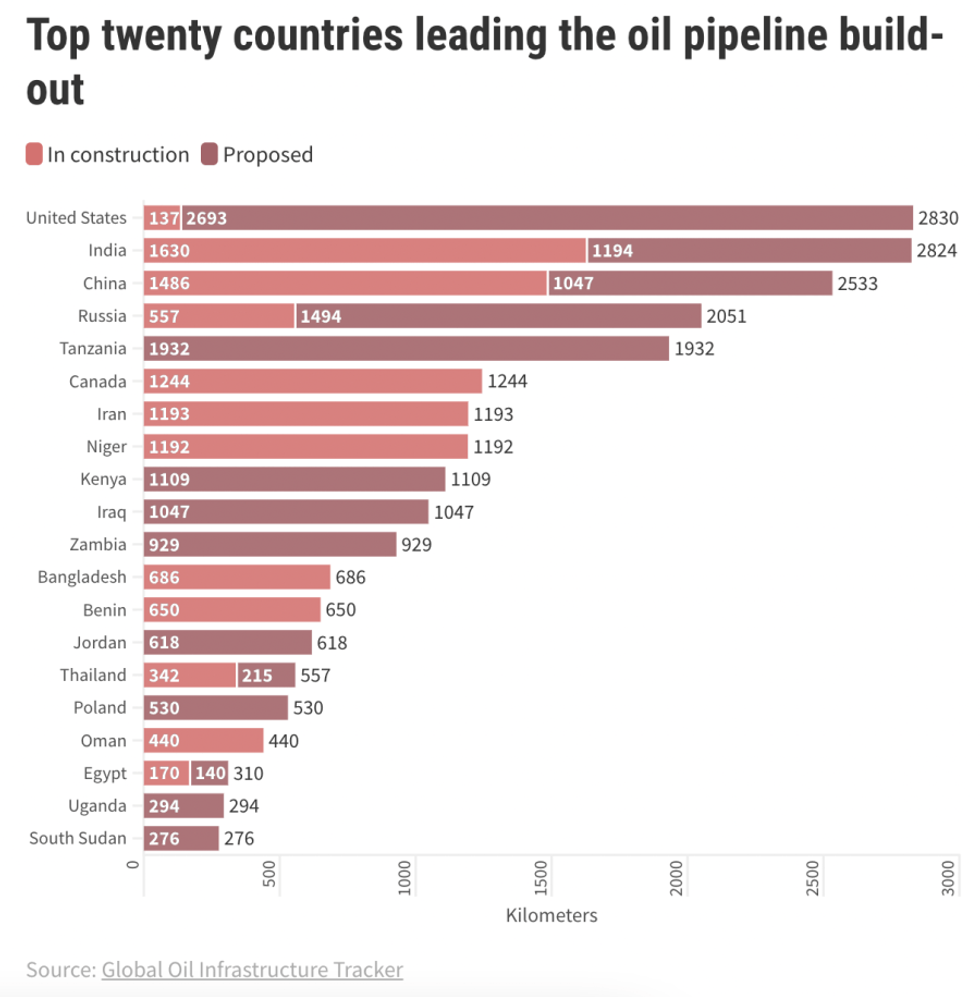

SUBSCRIBE TO OUR FREE NEWSLETTER
Daily news & progressive opinion—funded by the people, not the corporations—delivered straight to your inbox.
5
#000000
#FFFFFF
To donate by check, phone, or other method, see our More Ways to Give page.


Daily news & progressive opinion—funded by the people, not the corporations—delivered straight to your inbox.

Workers extract oil from oil wells in the Permian Basin in Midland, Texas on May 1, 2018. (Photo: Benjamin Lowy/Getty Images)
As climate scientists and frontline communities plead with governments to urgently phase out planet-wrecking fossil fuels, an analysis released Tuesday shows that nearly 15,000 miles of new oil pipelines are currently in development worldwide, potentially imperiling the hopes of curbing runaway warming.
Titled Crude Awakening: Oil Pipelines in Development Across the Globe, the new report from Global Energy Monitor (GEM) finds that the United States is currently pursuing more new oil pipeline capacity by length than any other country, with a total of around 1,700 miles of pipelines either proposed or already under construction.
The majority of U.S. pipeline construction is linked to the Permian Basin, a massive carbon bomb located in the country's southwest.
"Buoyed by record profits in 2021-22, the oil industry is moving ahead with a massive expansion of the global oil pipeline system," the report states. "Over 24,000 km of crude oil transmission pipelines are in development, about 40% of which are already under construction."
"Despite taking a backseat to the global gas boom in recent years," the analysis warns, "this expansion of crude oil infrastructure creates a substantial stranded asset risk for project developers and is dramatically at odds with plans to limit global warming to 1.5degC or 2.0degC."
GEM notes that the total projected cost of the worldwide oil pipeline buildout is around $75.4 billion, and pipelines under development are long enough to "stretch nearly two-thirds around Earth."
While emphasizing that "poor disclosure of pipeline capacity" makes exact greenhouse gas estimates difficult, GEM concludes that oil pipelines currently being built across the globe "would add about 8.3 million barrels per day (bpd) of crude oil transmission capacity, and projects that are in pre-construction would add an additional 21.8 million bpd."
"Together," the report estimates, "these additional capacities would generate 4.61 billion tonnes of CO2 annually."

The new analysis comes as the U.S. Senate is preparing to vote on a permitting reform plan pushed by right-wing Sen. Joe Manchin (D-W.Va.) that, if passed, would pave the way for final approval of the Mountain Valley fracked gas pipeline and fast-track other polluting oil and gas infrastructure.
Baird Langenbrunner, a research analyst at GEM, told The Guardian that the continued push for new oil pipelines in the face of dire warnings from scientists, the head of the United Nations, and others about the consequences of more fossil fuel development "shows an almost deliberate failure to meet climate goals."
"Despite climate targets threatening to render fossil fuel infrastructure as stranded assets," Langenbrunner added, "the world's biggest consumers of fossil fuels, led by the U.S. and China, are doubling down on oil pipeline expansion."
Dear Common Dreams reader, The U.S. is on a fast track to authoritarianism like nothing I've ever seen. Meanwhile, corporate news outlets are utterly capitulating to Trump, twisting their coverage to avoid drawing his ire while lining up to stuff cash in his pockets. That's why I believe that Common Dreams is doing the best and most consequential reporting that we've ever done. Our small but mighty team is a progressive reporting powerhouse, covering the news every day that the corporate media never will. Our mission has always been simple: To inform. To inspire. And to ignite change for the common good. Now here's the key piece that I want all our readers to understand: None of this would be possible without your financial support. That's not just some fundraising cliche. It's the absolute and literal truth. We don't accept corporate advertising and never will. We don't have a paywall because we don't think people should be blocked from critical news based on their ability to pay. Everything we do is funded by the donations of readers like you. Will you donate now to help power the nonprofit, independent reporting of Common Dreams? Thank you for being a vital member of our community. Together, we can keep independent journalism alive when it’s needed most. - Craig Brown, Co-founder |
As climate scientists and frontline communities plead with governments to urgently phase out planet-wrecking fossil fuels, an analysis released Tuesday shows that nearly 15,000 miles of new oil pipelines are currently in development worldwide, potentially imperiling the hopes of curbing runaway warming.
Titled Crude Awakening: Oil Pipelines in Development Across the Globe, the new report from Global Energy Monitor (GEM) finds that the United States is currently pursuing more new oil pipeline capacity by length than any other country, with a total of around 1,700 miles of pipelines either proposed or already under construction.
The majority of U.S. pipeline construction is linked to the Permian Basin, a massive carbon bomb located in the country's southwest.
"Buoyed by record profits in 2021-22, the oil industry is moving ahead with a massive expansion of the global oil pipeline system," the report states. "Over 24,000 km of crude oil transmission pipelines are in development, about 40% of which are already under construction."
"Despite taking a backseat to the global gas boom in recent years," the analysis warns, "this expansion of crude oil infrastructure creates a substantial stranded asset risk for project developers and is dramatically at odds with plans to limit global warming to 1.5degC or 2.0degC."
GEM notes that the total projected cost of the worldwide oil pipeline buildout is around $75.4 billion, and pipelines under development are long enough to "stretch nearly two-thirds around Earth."
While emphasizing that "poor disclosure of pipeline capacity" makes exact greenhouse gas estimates difficult, GEM concludes that oil pipelines currently being built across the globe "would add about 8.3 million barrels per day (bpd) of crude oil transmission capacity, and projects that are in pre-construction would add an additional 21.8 million bpd."
"Together," the report estimates, "these additional capacities would generate 4.61 billion tonnes of CO2 annually."

The new analysis comes as the U.S. Senate is preparing to vote on a permitting reform plan pushed by right-wing Sen. Joe Manchin (D-W.Va.) that, if passed, would pave the way for final approval of the Mountain Valley fracked gas pipeline and fast-track other polluting oil and gas infrastructure.
Baird Langenbrunner, a research analyst at GEM, told The Guardian that the continued push for new oil pipelines in the face of dire warnings from scientists, the head of the United Nations, and others about the consequences of more fossil fuel development "shows an almost deliberate failure to meet climate goals."
"Despite climate targets threatening to render fossil fuel infrastructure as stranded assets," Langenbrunner added, "the world's biggest consumers of fossil fuels, led by the U.S. and China, are doubling down on oil pipeline expansion."
As climate scientists and frontline communities plead with governments to urgently phase out planet-wrecking fossil fuels, an analysis released Tuesday shows that nearly 15,000 miles of new oil pipelines are currently in development worldwide, potentially imperiling the hopes of curbing runaway warming.
Titled Crude Awakening: Oil Pipelines in Development Across the Globe, the new report from Global Energy Monitor (GEM) finds that the United States is currently pursuing more new oil pipeline capacity by length than any other country, with a total of around 1,700 miles of pipelines either proposed or already under construction.
The majority of U.S. pipeline construction is linked to the Permian Basin, a massive carbon bomb located in the country's southwest.
"Buoyed by record profits in 2021-22, the oil industry is moving ahead with a massive expansion of the global oil pipeline system," the report states. "Over 24,000 km of crude oil transmission pipelines are in development, about 40% of which are already under construction."
"Despite taking a backseat to the global gas boom in recent years," the analysis warns, "this expansion of crude oil infrastructure creates a substantial stranded asset risk for project developers and is dramatically at odds with plans to limit global warming to 1.5degC or 2.0degC."
GEM notes that the total projected cost of the worldwide oil pipeline buildout is around $75.4 billion, and pipelines under development are long enough to "stretch nearly two-thirds around Earth."
While emphasizing that "poor disclosure of pipeline capacity" makes exact greenhouse gas estimates difficult, GEM concludes that oil pipelines currently being built across the globe "would add about 8.3 million barrels per day (bpd) of crude oil transmission capacity, and projects that are in pre-construction would add an additional 21.8 million bpd."
"Together," the report estimates, "these additional capacities would generate 4.61 billion tonnes of CO2 annually."

The new analysis comes as the U.S. Senate is preparing to vote on a permitting reform plan pushed by right-wing Sen. Joe Manchin (D-W.Va.) that, if passed, would pave the way for final approval of the Mountain Valley fracked gas pipeline and fast-track other polluting oil and gas infrastructure.
Baird Langenbrunner, a research analyst at GEM, told The Guardian that the continued push for new oil pipelines in the face of dire warnings from scientists, the head of the United Nations, and others about the consequences of more fossil fuel development "shows an almost deliberate failure to meet climate goals."
"Despite climate targets threatening to render fossil fuel infrastructure as stranded assets," Langenbrunner added, "the world's biggest consumers of fossil fuels, led by the U.S. and China, are doubling down on oil pipeline expansion."